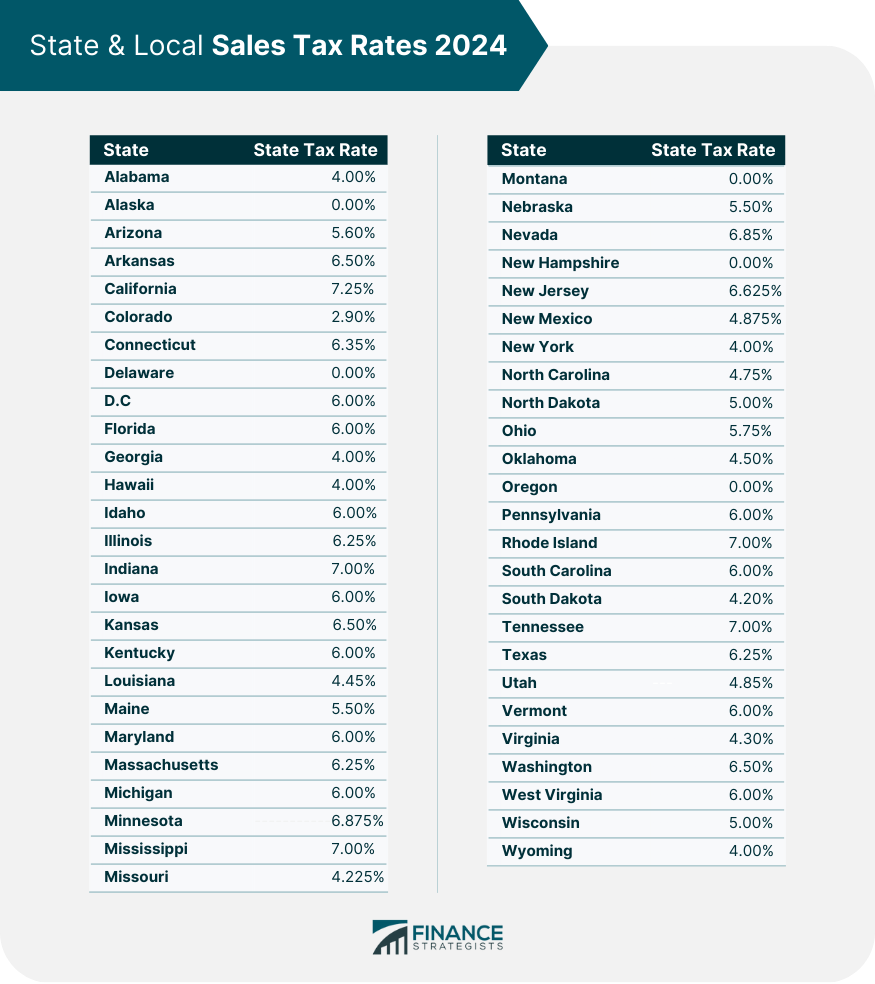A sales tax is a tax charged on the sale of goods or services. The consumer pays the tax to the retailer at the time of purchase. The seller then remits the taxes to the government. State and local governments require sales taxes and contribute 29.52% of the total state tax revenue. They vary widely from one jurisdiction to another and depend on the type of goods or services. Sales taxes are often confused with value-added taxes (VAT), but they are two different types of taxes. Value-added taxes are imposed on the sale of goods or services at each production stage, from the raw materials to the finished product. In the United States, sales taxes are imposed at the state and local levels. Forty-five states and Washington D.C. all have some form of sales tax. Below are the five states that do not have sales tax. Alaska does not have a state-imposed sales tax, but some sales taxes are levied in a few local towns. Kalifornsky, for example, levies a 3% municipal sales tax. Juneau, the state capital, levies a 5% sales tax. Even without sales taxes, the state government earns heavily on petroleum revenues, which nearly account for 85% of the state budget. The state also taxes other natural resources, such as timber, fish, and minerals. Additional personal property tax on the local level and corporate tax are implemented to earn revenue. The state of Delaware does not levy a state sales tax on its people or tourists. Also, no localities in Delaware impose any sales taxes. However, Delaware charges a gross sellers tax on businesses for the total amount of sales from products and services sold. The state relies heavily on moderate income tax returns and corporate income taxes. It has a graduated state individual income tax ranging from 2.2% to 6.6%. Corporate income tax is at 8.7%. Another state that does not have state sales tax is Montana, which is a slightly underpopulated state. However, local areas that are popular with tourists charge local sales tax. Montana covers their revenue by implementing heavy individual and corporate income taxes. Senate Bill 159 reduced the highest marginal tax rate for individuals, estates, trusts, and pass-through entities from 6.9% to 6.75% on any taxable income over $19,800. The state of New Hampshire and any of its localities do not collect sales taxes. Certain goods and services such as rooms, meals, car rentals, and restaurants have excise taxes ranging from 8.5% to 9%. These taxes are to be paid by consumers and collected by the business operators. The state also assesses a 5% tax on interest and dividend income that exceeds $2,400 annually ($4,800 for joint filers) with a few exemptions. The state’s property taxes are at an average of $19.26 per $1,000 assessed value in 2021. No sales taxes are being collected in Oregon at the state and local levels. High income taxes ranging from 4.75% to 9.90% are used to compensate for the absence of sales tax. Some local municipalities can even impose additional local income taxes. Corporate income taxes are at 6.6% to 7.6%. The state considers property taxes as one of the most important sources of revenue for more than 1,200 local taxing districts. For the fiscal year 2021-2022, its statewide average property tax rate is $17.26 per $1,000 assessed value. Listed above are the state and local sales tax rates for 2024. The state sales tax rate generally ranges from 2.9% to 7.25%, with California having the highest state sales tax. Only five states, Alaska, Delaware, Montana, New Hampshire, and Oregon, do not require consumer sales tax. Instead of sales taxes, they depend on industry revenues and higher property and income taxes. Sales tax rates vary across states, and consumers must note that some local municipalities in each state charge an additional local sales tax. The different tax rates across states allow consumers to lessen their taxes if they purchase goods and services at the correct location.What Is a Sales Tax?
Five States Without Sales Tax

State & Local Sales Tax Rates 2024

Quick Facts
Final Thoughts
States With No Sales Tax FAQs
There are five US states that do not impose a sales tax: Alaska, Delaware, Montana, New Hampshire, and Oregon.
Yes, all purchases made in any state may be subject to other taxes such as local taxes, county taxes, or state income tax.
Alaska, Delaware, Montana, New Hampshire, and Oregon may have different kinds of taxes including personal income tax, corporate income tax, excise taxes, and property taxes.
Yes, depending on the state in which you are purchasing the item, you may need to pay sales tax.
There may be restrictions imposed by individual states such as minimum purchase amounts or specific types of goods or services that are exempt from sales tax. It is important to check with the appropriate government agency for each state before making any purchases.
True Tamplin is a published author, public speaker, CEO of UpDigital, and founder of Finance Strategists.
True is a Certified Educator in Personal Finance (CEPF®), author of The Handy Financial Ratios Guide, a member of the Society for Advancing Business Editing and Writing, contributes to his financial education site, Finance Strategists, and has spoken to various financial communities such as the CFA Institute, as well as university students like his Alma mater, Biola University, where he received a bachelor of science in business and data analytics.
To learn more about True, visit his personal website or view his author profiles on Amazon, Nasdaq and Forbes.











